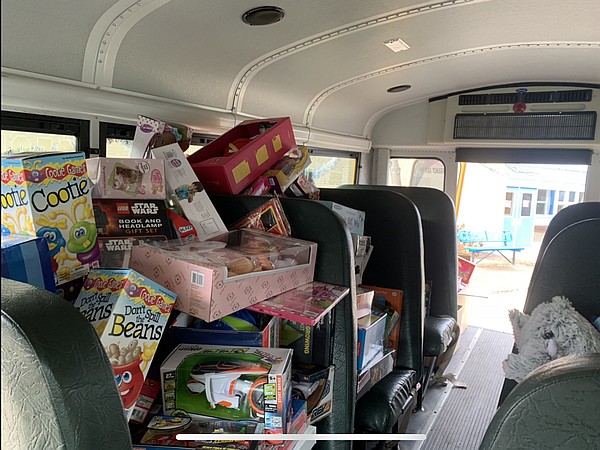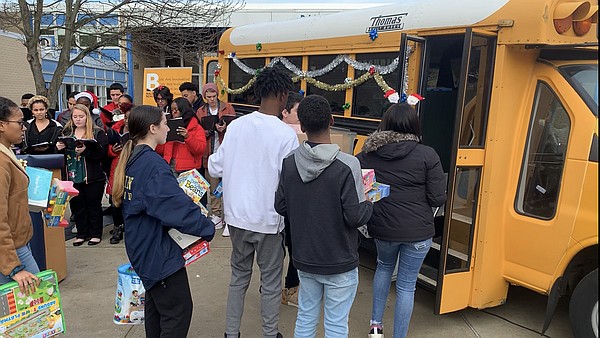Kindness On The Curriculum
- Details
- Written by David R. Hamilton PhD

I spent some time in New York City last weekend. I’m writing a series of pieces for Psychologies Magazine called ‘The Kindness Conversation’ where I basically have, well, conversations about kindness. In New York, I had my kindness conversation with Cynthia Germanotta, mother of Lady Gaga.
Cynthia is president and co-founder (with her daughter) of Born This Way Foundation, a charity whose mission it is to create a kinder and braver world. They focus much of their efforts on inspiring kindness in young people.
After our conversation (which will be in Psychologies Mag in a few months’ time), we headed out to Baldwin High School, a school on Long Island, to participate in a kindness project that the kids there have been involved with. These kids had bought over 400 Christmas presents for children whose families are homeless.
When we arrived at the school, all of the presents had been gathered together in a large hallway in the school before the kids took armfuls each and carried them out to a school bus. They literally packed the bus full of presents. Once filled, the bus was then driven to Bethany House, which provides emergency and transitional housing for homeless families in Long Island.

As part of their ‘Multiply Your Good’ campaign, Born This Way Foundation matched the number of presents with gifts of clothing for the children from one of their partners, thus doubling the volume of donations and so that the children of Bethany House would receive toys and clothing at Christmas.
As I write this, I am in awe of the kindness I witnessed at the school. It touched me deeply. Similar to my last experience in a school (see My Day Talking Kindness to Young Children), I found myself blown away by what I witnessed. People have often remarked that I am a kind person because I write and speak about kindness. In some ways, I am trying to use my skills to spread kindness, which is why I write and teach. But I cannot help but feel that there is a difference from writing and speaking about it and actually being on the front line doing it, like these kids were. It was a real humbling experience.
The teachers at the school deserve a special applause too for having the vision and desire to involve the school kinds in such a rewarding programme where, at their young age, they could have first-hand experience of kindness, what it means, and how it makes a difference. I think it’s a great idea to involve kids in kindness projects like this, so that they can learn about kindness through experience at a young age and also, through further school work, can explore the consequences of kindness, the impact it can have on people’s lives.
Surely, learning about kindness while at school is as important as learning to read and write, as important as maths, science, music, art and languages. Kindness is fundamental to our interactions with each other. It’s a way of being, a way that colours the nature of these interactions. It is fundamental at all levels of society. It is fundamental in building and maintaining healthy communities.
Kindness is getting more column space in newspapers and magazines now than at any other time I can remember. Perhaps it’s an antidote to some of the aggression and division we see so much of in the world at the moment, especially on the political scene. Perhaps we subconsciously seek to counterbalance division with kindness, because kindness unifies.
Kindness brings people together. It dissolves disagreement and hatred. Or as philosopher, Albert Schweitzer, wrote, “Constant kindness can accomplish much. As the Sun makes ice melt, kindness causes misunderstanding and hostility to evaporate.”
Kindness is like glue that holds us all together. What would we be without kindness? Where would we be if we all sought to look out only for ourselves? Kindness includes others.
I think kids should be learning what kindness is in school; how it matters, why it matters, its consequences. Kindness should be on the curriculum of all schools.
I was bullied at school when I was 16-17 years old. I often wonder if things would have been the way they were for me if kindness had been on our school curriculum. Would I still have been bullied? Perhaps! Perhaps not! But I do believe that, in general, a curriculum that included studies on kindness, with opportunities for further study in later school years, would result in a noticeable drop in bullying and a significant increase in tolerance and unity and perhaps even academic performance.
Kids could be learning why kindness matters, how it impacts our health, how it spreads by inspiring ‘pay it forward’ behaviour in others. They could be learning how to actually be kind, the multiple forms it can take, from saying thank you, to paying a compliment, to listening, to being there for a friend or family member, to volunteer work, to helping people in the community, to refraining from bullying.
They could learn about the science of kindness and how it impacts our health, from how it makes us happier, can reduce risk of depression and anxiety, how it helps build resilience by counteracting stress, to how it impacts the heart and arteries, the nervous system and immune system.
The curriculum could involve practical experience of volunteering in the community, with a written report that encourages the kids to reflect on the impact of the work they did. Older kids studying kindness may even, as part of their own projects, help tutor younger kids in some of their school subjects.
Perhaps kindness as a compulsory subject on the school curriculum would have further reaching consequences too, as kids move on after school and take what they have learned into the wider world. Perhaps it would have knock-on effects in business, in how business is conducted, on the reasons why business is conducted.
Many kids who learned kindness at school may become business leaders and influence how business is done. Many could find their way into politics and their knowledge and experience of kindness may influence decisions taken at national and international levels, which surely will benefit all of us. I think we may then see the world coming together in greater ways as we recognise and embrace our common humanity, as we celebrate our similarities instead of squabbling about our differences.
“We look for a glorious dénouement [end result],” said Archbishop Desmond Tutu in the film and book, Choice Point (which I’m also in), “when we will discover that we are actually members of one family.” I think kindness on the curriculum might really help us with such a goal.
This might sound idealistic or even fanciful thinking, but I think it’s already happening. There are pockets of this happening everywhere, even if not formally, not least at Baldwin High School, but also in the school that my friend John teaches at, where he teaches young kids on the ASD spectrum. Their whole school did a kindness project. Some of the kids in John’s class wrote letters to me a few weeks later to tell me the sorts of acts of kindness they had been doing and what kindness their classmates had shown them. I know there are many more schools making kindness a fundamental part of children’s education and experience.
Kindness matters. Kindness makes a difference. Being kind also inspires kindness in others. It is contagious. That is a fact. I think it’s spreading through schools now. And at a time of year when we worry about catching a cold or flu, kindness is one ‘bug’ that I think we would all do well to catch.
David R. Hamilton PhD
After completing his PhD, David worked for 4 years in the pharmaceutical industry developing drugs for cardiovascular disease and cancer. During this time he also served as an athletics coach and manager of one of the UK’s largest athletics clubs, leading them to three successive UK finals. Upon leaving the pharmaceutical industry, David co-founded the international relief charity Spirit Aid Foundation and served as a director for 2 years.
Now a bestselling author of 6 books published by Hay House, he offers talks and workshops that fuse science, the mind, and spiritual wisdom. David writes a regular blog for the Huffington Post.
Source Here
Liked this article? Dive deeper into personal growth and wellness! Check out CrystalWind.ca for spiritual wisdom or explore AromaWorx.ca for natural well-being tips. Spread the positivity—share this with friends on their happiness journey!
Let’s Chat! Drop Your Thoughts Below! ![]()
Latest Articles

Imagine a world of inspiration and healing, free for all—made possible by YOU!
Donate Now—Ignite the Magic at CrystalWind.ca!

Epilepsy - Finding A Cure
Your donation can make a difference!
Help us find a cure – donate now!
Unlock Your Light: Join Lightworkers Worldwide on CrystalWind.ca!
Follow Us!
Featured This Month
Abalone Shell
Echos Of The Ancestors Abalone strengthens the structure of the body and th... Read more
Sun in Cancer
Cancer Sun Sign Characteristics Overview The name "Cancer" comes from Latin, ... Read more
Chalcedony
The Stone Of Orators Chalcedony was very popular as a decorative stone in ant... Read more
Lugh - Celtic God Of The Sun
The god Lugh was worshiped in Ireland as a deity of the sun. This connection... Read more
Lammas by The Hedgewitch
Although in the heat of a Mid-western summer it might be difficult to discer... Read more
Egyptian Zodiac/Astrology
Egyptian astrology was one of the earliest forms of astrology. The Egyptians w... Read more
Cancer Mythology
The Mythology of Cancer: A Celestial Tale of Loyalty and Sacrifice Among th... Read more






























































































































































